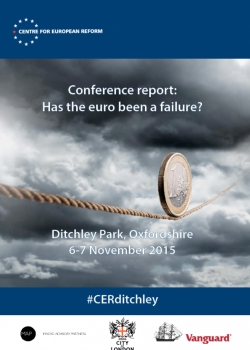
Has the euro been a failure?
November’s conference, which brought together 50 leading economists, considered whether the euro was a failure. A host of questions were debated. How should the euro be judged? Purely by the fact that it has survived? Or by the fact that is has become a significant international reserve currency? Or by comparing what its proponents said it would do for Europe with what had actually happened? Had the euro helped Europe to address the economic and political challenges facing it? Or had it made it harder to address those challenges, while also creating new ones? Could a dismantling of the eurozone open the way for economic recovery and an easing of political tensions? Or would it unleash unmanageable economic and political instability?
There was broad consensus that the euro had been a disappointment: the currency union’s economic performance was very poor, and rather than bringing EU member-states together and fostering a closer sense of unity and common identity, the euro had divided countries and eroded confidence in the EU. While only a few participants thought it possible or advisable to dismantle the eurozone, there was broad pessimism over the ability of the eurozone political elite to sell the needed integrationist steps to their increasingly disillusioned electorates.
For most participants there was a widening gap between what was needed – more integration, risk sharing, and solidarity – and what electorates were prepared to support. The eurozone could only flourish with institutions founded on democracy; rules were a poor substitute and lacked legitimacy as they were effectively set by a select group of member-states and the ECB. For a minority, the rules were the right ones, and the eurozone could work if countries abided by them. For another minority, the problems were the result of policy mistakes, not the eurozone’s institutional set-up.
For some participants, dismantling the eurozone would cause devastating financial dislocation. And it would not help countries regain competitiveness or cut real interest rates as their problems lay in industrial structures and monetary sovereignty was illusory. Others countered that there would be financial instability in any case, as weak growth and inflation led to debt write-downs. Dissolution would be messy, but misaligned real exchange rates were a problem and required adjustment. National institutions would be better able to deliver the needed mix of fiscal and monetary policies.
Participants broadly agreed that both euro breakup and muddling through carried political risks. For some, dissolution would do fatal damage to the EU, rendering Europe even less able to cope with the myriad challenges facing it. Others were less pessimistic: dissolution would create legal uncertainty, but contracts would be resolved to the benefit of the debtors, easing populist pressures in those countries. And, in any case, if eurozone growth remained weak, the number of eurozone citizens backing populist parties would continue to rise, leading to paralysis of the political system.
Finally, the participants discussed the impact of the crisis on Britain’s membership of the EU. The worst scenario would be muddling through in the eurozone as this would mean continued large-scale migration into the UK, inflaming hostility to the EU. An integrated and successful eurozone was certainly in the UK’s interests and should be consistent with continued EU membership so long as Britain engaged constructively and the eurozone showed sensitivity to British concerns.

